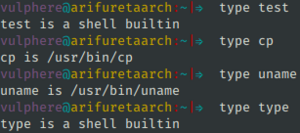Type (Unix)
 From Handwiki
From Handwiki
 Examples of type command | |
| Original author(s) | AT&T Corporation |
|---|---|
| Developer(s) | Various open-source and commercial developers |
| Initial release | 1984 |
| Operating system | Unix and Unix-like |
| Platform | Cross-platform |
| Type | Command |
In Unix and Unix-like operating systems, type is a command that describes how its arguments would be interpreted if used as command names.
Function
Where applicable, type will display the command name's path. Possible command types are:
- shell built-in
- function
- alias
- hashed command
- keyword
The command returns a non-zero exit status if command names cannot be found.
Examples
$ type test test is a shell builtin $ type cp cp is /bin/cp $ type unknown unknown not found $ type type type is a shell builtin
History
The type command was a shell builtin for Bourne shell that was introduced in AT&T's System V Release 2 (SVR2) in 1984,[1] and continues to be included in many other POSIX-compatible shells such as Bash. However, type is not part of the POSIX standard. With a POSIX shell, similar behavior is retrieved with
command -V name
In the KornShell, the command whence provides similar functionality.[2]
The command is available as a separate package for Microsoft Windows as part of the UnxUtils collection of native Win32 ports of common GNU Unix-like utilities.[3]
See also
- List of Unix commands
- which (command)
- hash (Unix)
References
- ↑ "traditional Bourne shell family / history and development". https://www.in-ulm.de/~mascheck/bourne/index.html.
- ↑ Siever, Ellen (27 July 2005). Linux in a Nutshell. Nutshell handbooks. O'Reilly Media, Inc. (published 2005). p. 695. ISBN 9780596009304. https://books.google.com/books?id=WQPQEbGx73EC. Retrieved 2016-07-05. "whence [...] Korn shell only. Show whether each command is a Unix command, a built-in command, a defined shell function, or an alias."
- ↑ Native Win32 ports of some GNU utilities
 |
Categories: [Standard Unix programs]
↧ Download as ZWI file | Last modified: 07/25/2024 23:24:56 | 93 views
☰ Source: https://handwiki.org/wiki/Software:Type_(Unix) | License: CC BY-SA 3.0

 KSF
KSF